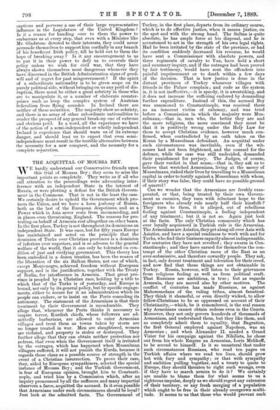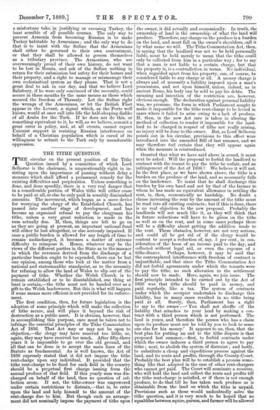THE ACQUITTAL OF MOUSSA BEY.
WE hardly understand our Conservative friends upon this trial of Moussa Bey ; they seem to miss the important points so completely. They write as if all who call attention to the proceedings were advocating inter- ference with an independent State in the interest of Russia, or were plotting a defeat for the British Govern- ment in the Commons. That is not in the least the case. We certainly desire to uphold the Government which pro- tects the Union, and we have a keen jealousy of Russia, both as the last of the European despotisms, and as a Power which in Asia never rests from incommoding, and in places even threatening, England. The reasons for pro- testing on behalf of Armenia rest altogether on other bases. In the first place, Turkey is not throughout its dominions an independent State. It was once, but for fifty years Europe has maintained and acted on the principle that the dominion of Turks over Christian provinces is a dominion of inferiors over superiors, and is so adverse to the general welfare of the world, that it can only be tolerated on con- dition of just and vivifying government. This theory has been embodied in a dozen treaties, has been the reason of the liberation of the six Balkan States, not one of which, except Montenegro, achieved freedom without European support, and is the justification, together with the Treaty of Berlin, for interference in Armenia. That great pro- vince is peopled by a Christian race, holding by a title to which that of the Turks is of yesterday, and Europe is bound, not only by its general policy, but by specific engage- ments, either to secure for it an administration which its people can endure, or to insist on the Porte conceding its autonomy. The statement of the Armenians is that their treatment by their Government is unendurable. They allege that, whenever the Porte thinks it necessary to inspire terror, Kurdish chiefs, whose followers are ad- mittedly barbarians, are allowed to enter Armenian villages and treat them as towns taken by storm are no longer treated in war. Men are slaughtered, women are violated, and property is stolen or destroyed. They further allege that they can obtain neither protection nor redress, that even when the Government itself is irritated by the outrages, which has happened when Mussulman villagers suffered, it will not punish the Kurds, because it regards those clans as a possible source of strength in the event of a Christian insurrection. To prove their case, they, aided. by European sympathisers, selected the special instance of Moussa, Bey ; and the Turkish Government, in fear of European opinion, brought him to Constanti- nople,- and tried him by a Commission which, after an inquiry pronounced by all the sufferers and many impartial observers a farce, acquitted the accused. Is it even possible that Armenians under such circumstances should be loyal? Just look at the admitted facts. The Government of Turkey, in the first place, departs from its ordinary course, which is to do effective justice, when it means justice, on the spot and with the strong hand. The Sultan is quite absolute, he has ample force at his disposal, and he is accustomed to act in the strength of his own legal rights. Had he been irritated by the state of the province, or had its condition suddenly decreased his revenue, he would have sent a Commissioner with absolute powers, and three regiments of cavalry to Van, have held a short and summary inquiry, and if the outrages had been proved by fair testimony, would have sent the offenders into painful imprisonment or to death within a few days of the decision. That is how justice is done in the distant provinces of Turkey whenever villages with friends in the Palace complain ; and rude as the system is, it is not ineffective,—it is speedy, it is awestriking, and it does not increase the suffering endured by demanding further expenditure. Instead of this, the accused Bey was summoned to Constantinople, was received there as an innocent victim of calumny, and was tried before a Commission in which the majority were Mus- sulmans,—that is, men who, the better they are and the more religious, the more convinced they must be that it is positively wrong under the Holy Law for them to accept Christian evidence, however much con- firmed, when contradicted by an oath taken on the Koran by a Mussulman defendant. An acquittal under such circumstances was inevitable, even if the wit- nesses had not been frightened, and the counsel for the defence, while the case was still undecided, demanded their punishment for perjury. The Judges, of course, gave their verdict in that sense,—that is, they ask us to believe that wretched Armenians, living at the mercy of Mussulmans, risked their lives by travelling to a Mussulman capital in order to testify against a Mussulman with whom, if their story was false, they could have no possible ground of quarrel !
Can we wonder that the Armenians are freshly exas- perated, or that, being treated by their own Govern- ment as enemies, they turn with reluctant hope to the foreigners who already rule nearly half their kinsfolk ? They turn to them, it is alleged, out of rebellious feeling against Constantinople, a feeling independent of any treatment; but it is not so. Again just look at the facts. The only Christian community which has ever loyally acquiesced in Turkish rule is the Armenian. The Armenians are Asiatics, they get along all over Asia with Asiatics, and have a special readiness to work with and for Turks, who find their business capacity almost indispensable. For centuries they have not revolted ; they swarm in Con- stantinople ; and they have earned for themselves the con- tempt of the other Christian races of the East as an over-submissive, and therefore cowardly people. They ask, in fact, only decent treatment and toleration for their creed, and now find that those things are not obtainable in Turkey. Russia, however, will listen to their grievances from religious feeling as well as from political craft. That Russians are ambitious, is true ; but as regards Armenia, they are moved also by other motives. The conflict of centuries has made Russians, as against Mahommedans of the ruling tribes, almost fanatical. They think it shameful, or even directly wicked, to allow fellow-Christians to be so oppressed on account of their Christianity,—which, be it remembered, is the real reason why Armenians cannot obtain redress even in the Courts. Moreover, they not only govern hundreds of thousands of Armenians, and understand them, but they like them, and so completely admit them to equality, that Bagration, the first General employed against Napoleon, was an Armenian ; and when Alexander II. needed a Grand Vizier for his campaign against the Nihilists, he chose out from his whole Empire an Armenian, Loris Melikoff, to be second to himself. Is it so unnatural that under such circumstances Russians, who read ten pages on Turkish affairs where we read ten lines, should grow hot with fury and sympathy ; or that with sympathy and ambition pulling together, and a treaty to quote to Europe, they should threaten to right such wrongs, even if they have to march armies to do it ? We certainly are unable to blame them for what seems to us a righteous impulse, deeply as we should regret any extension of their territory, or any fresh merging of a population which ought to be free in their already overgrown multi- tude. It seems to us that those who would prevent such a misfortune take, in justifying or excusing Turkey, the least sensible of all possible courses. The only way to prevent Armenia from becoming Russian is to make Turkey habitable by Armenians ; and the only way to do that is to insist with the Sultan that the Armenians shall either be governed to their own contentment, or that they shall be allowed to govern themselves as a tributary province. The Armenians, who are overweeningly proud of their own history, do not want to be lost in Russia, and ask of the Sultan nothing in return for their submission but safety for their homes and their property, and a right to manage or mismanage their own ecclesiastical system as they please. That is not a great deal to ask in our day, and that we believe Lord Salisbury, if he were only convinced of the necessity, could secure in three months by the same means as those which secured the freedom of Thessaly. Let the Sultan right the wrongs of the Armenians, or let the British Fleet appear in the Levant, a signal which, as the Porte well knows, would at once call into life the half-sleeping dislike of all Arabs for the Turk. If he does not do this, or something equivalent to it, he will, as we believe, commit a great error in policy, and, at all events, cannot expect Unionist support in resisting Russian interference on behalf of a Christian population which is cured of its willingness to submit to the Turk only by unendurable oppression.























































 Previous page
Previous page